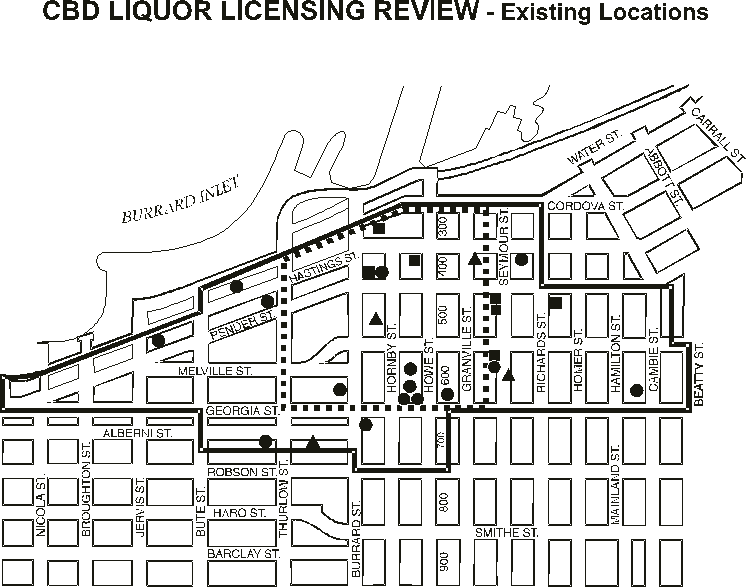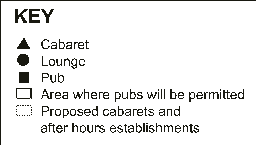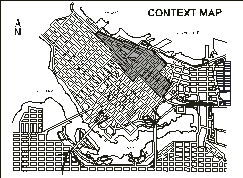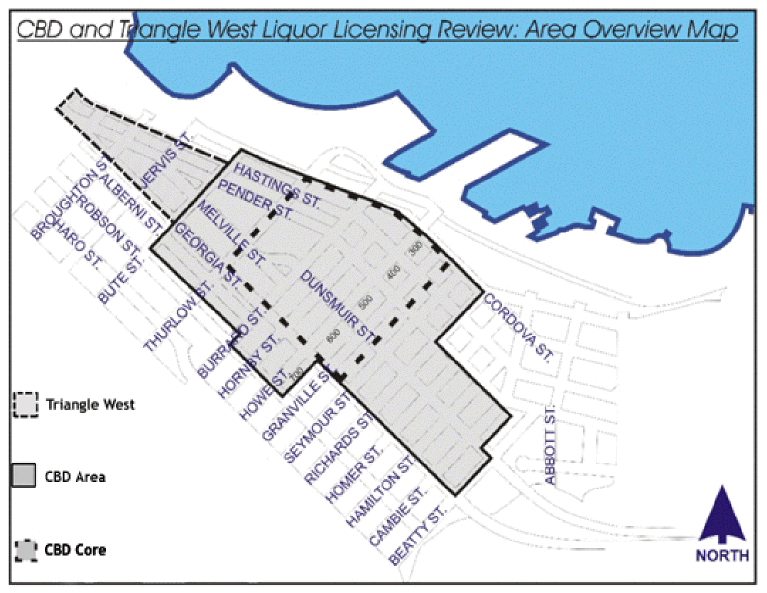
POLICY REPORT
Date: August 28th, 2001
Author/Local: A. Straka 604-873-7546
G. Gusdal 604-873-6461
RTS No. 02201
CC File No. 2611
P&E: September 13, 2001
TO: |
Standing Committee on Planning and Environment |
FROM: |
The Chief License Inspector, the Director of Current Planning and the Director of Social Planning |
SUBJECT: |
Central Business District Liquor License Policy |
RECOMMENDATION
A. THAT Council adopt the following liquor license policy for the Central Business District (CBD):
i. Limit the number and proximity of additional liquor license establishments to ensure that the CBD does not develop into an entertainment district;
ii. Support only new cabaret proposals that will result in hotel lounge/pub or cabaret seat relocations/transfers from other neighbourhoods with land use incompatibility issues;
iii. Support only smaller liquor license establishments in areas surrounding the CBD core where housing is permitted in order to minimize negative impacts;
iv. Support a limited number of legal, non-alcohol late-night entertainment opportunities; and
v. Pursue a greater variety of entertainment opportunities for existing and proposed liquor license establishments (e.g. hours of operation, establishment size, etc.) .
B. THAT Council adopt the implementation strategy as outlined in Appendix A to achieve the goals of the CBD Liquor License Policy.
GENERAL MANAGER'S COMMENTS:
The General Manager of Community Services RECOMMENDS approval of A and B.
COUNCIL POLICY:
On December 3, 1991, Council approved the Central Area Plan for Vancouver's downtown area. This plan advocates the creation of an "Alive Downtown" with a central area that has a mix of activities with quieter neighbourhoods where people live close to more active areas where people shop and play as well as work. This plan states that residential rezoning in the CBD may be considered where retention of a heritage building can be facilitated or essential business support facilities (ie. business clubs) that reinforce CBD business can be provided. Any residential rezonings in the CBD area require Council approval.
Currently, there is no comprehensive Council liquor license policy for the Central Business District neighbourhood. Applications in this area are assessed on a case-by-case basis using established Council practices as follows:
1. Applications that may typically be approved based solely on the results of neighbourhood notification include: small hotel lounges or pubs; amendments to an existing liquor license and some types of new liquor license establishments in areas of the City where there are little or no residential uses in close proximity.
2. A public meeting will normally be recommended for all new liquor licenses in close proximity to residential uses, new liquor licensed facilities that may have a negative impact on City resources or adjacent businesses, and major amendments to existing liquor licenses in the same scenarios. (This includes, but is not limited to, the following: Class "A" Hotel Lounge/Pub, Class "A" Lounge (private/social club), Restaurant Class 2- "B-2" Dining Lounge, Class "C" Cabaret, Class "D" Neighbourhood Pub, Class "F" Marine Pub and applications to change the hours of operation or increase seating capacity of the aforementioned liquor license categories).
3. The successful completion of a telephone survey in accordance with City guidelines may be required with any liquor license application if significant neighbourhood issues are identified.
4. All new establishments are subject to a time-limited development permit, a Good Neighbour Agreement and possibly a legal operating agreement. Amendments to existing liquor licenses are typically subject to a legal operating agreement.
PURPOSE AND SUMMARY
This report recommends a liquor license policy and an implementation strategy for the Central Business District. They were created in response to Council's direction for the development of liquor license policies for the West End and Central Business District that would assist in focusing its decision-making process and provide the industry and public at large with clear guidelines. A liquor license policy for the West End was completed and endorsed by Council on May 18, 2000.
The boundaries of the CBD liquor license study area roughly encompass Georgia and Robson Streets to the south, Hastings and Cordova Streets to the north, Beatty Street to the east and Bute Street to the west as illustrated in Appendix B. The policy also covers the area west of Bute Street, along West Georgia Street, Melville Street, and Pender Street. Although this area is not part of the Central Business District, it was included due to the absence of any liquor policy for it. The area is called Triangle West in this report.
The Central Business District liquor license policy contains the following main policy objectives:
i. Limit the number and proximity of additional liquor license establishments to ensure that the CBD does not develop into an entertainment district;
ii. Support only new cabaret proposals that will result in hotel lounge/pub or cabaret seat relocations/transfers from other neighbourhoods with land use incompatibility issues;
iii. Support only smaller liquor license establishments in areas surrounding the core of the CBD where housing is permitted in order to minimize negative impacts;
iv. Support a limited number of legal, non-alcohol late-night entertainment opportunities; and
v. Pursue a greater variety of entertainment opportunities for existing and proposed liquor license establishments (e.g. hours of operation, establishment size, etc.) .
The above policy objectives will be implemented through the following strategy:
· Support two 97 seat pubs (with 20 patio seats) in the core of the CBD and two 65 seat pubs (with 20 patio seats) in areas surrounding the core of the CBD.
· Support the transfer of Class "A" Hotel Pub/Lounge or Class "C" Cabaret seats to the CBD from Downtown South, the Downtown-Eastside, Gastown and other areas of the city with a history of land use incompatibility issues. Proposed establishments with live amplified music and over 350 seats are to be physically integrated with a hotel.
· Support two non-alcoholic dance halls (late-night cabarets) in the core of the CBD subject to Council's policies and procedures for Cabarets Not Licensed to Serve Alcohol (Non-Alcoholic Dance Halls) adopted on December 8th, 1998.
· Temporary event-specific capacity increases and closing time extensions by a further 30 minutes to one hour and from midnight to 2 am on Sundays preceding a holiday Monday (subject to approval by the Chief License Inspector and Police) will be supported for cabarets in the core of the CBD.
· The Liquor Control and Licensing Branch will be consulted concerning a permanent extension to Cabaret closing times in the downtown peninsula (excluding the moratorium areas of Gastown, Chinatown and the Downtown-Eastside) to 4am (subject to Council endorsement) and temporary extensions up to 12 times per year to 7 am. Liquor service for both extensions would cease at 2 am.
Appendix C provides a table summarizing the number of existing and proposed establishments in the CBD.
A public consultation process, including a preliminary stakeholders meeting, two focus group meetings and an Open House, was undertaken to obtain feedback/comments on the proposed CBD liquor license policy and implementation strategy. Overall, there was not a lot of interest in the issue as evident by the number of questionnaires completed. However, the feedback submitted was generally favourable and supportive of the policy.
The CBD Liquor License Policy will be monitored and any major issues that should arise will be reported to Council.
BACKGROUND
On November 26, 1999, Council endorsed a two-phased proposal, encompassing a planning process, resources and budget, for the development of separate liquor license policies for the West End and the Central Business District. The policies were intended to provide Council with a policy framework and a course of action and the industry and community at large with clear guidelines and terms of reference for liquor license applications in these areas.
The West End Liquor License Policy was approved by Council on May 18, 2000. Council also simultaneously resolved to defer consideration of the portion of this policy pertaining to a cabaret in the Robson Village and Burrard Street area (1000-1700 block, including north side only of 1700 block of Robson Street, and the 800-1000 block of Burrard Street) until the second-phase of the proposal, the development of a liquor license policy for the Central Business District, was presented to Council. This will be the subject of a future report.
A liquor license policy specifically tailored to the Central Business District and the triangular area immediately west, bordered by Bute Street, along West Georgia Street, Melville Street and Pender Street, has now been developed and is the subject of this report. The policy designed to reflect the attitudes and needs of this Downtown area has been prepared by staff with representatives from Licenses & Inspections, the Police, Social Planning and Planning, in consultation with industry and tourism representatives, CBD workers, local business organizations and neighbouring residents. The policy also takes necessary measures to protect the livability of residents in the CBD by ensuring that all additional cabarets, non-alcoholic dance halls and larger pubs with a patron capacity of up to 97 seats are located within the CBD Core where residential units are at a minimum. Appendix D illustrates the existing and proposed residential buildings/units within the overall CBD area.
Public Consultation Process
The public consultation component of the Central Business District liquor license policy review commenced on June 29th, 2000 with a preliminary stakeholders meeting and informal discussions with senior City staff. An initial proposal was prepared shortly afterwards. Two focus group meetings with industry and tourism representatives and CBD workers, business organizations and neighbouring residents were subsequently held to discuss the details of the proposal. These meetings were followed by an all-day Open House at the downtown public library where the general public had an opportunity to ask questions and provide feedback, either verbally or through a questionnaire. Meeting times for the focus groups and Open House were advertised in the WestEnder, the Loop, the Vancouver Courier and the Georgia Strait community newspapers. Overall, there was not a lot of interest in the topic as only 30 questionnaires were returned from a total of approximately 250 distributed. Nevertheless, the following key messages were expressed:
· The economic viability of new liquor establishments in the CBD is a concern due to the high lease/rent cost and the potential limitation on the permitted size of cabarets in the area.
· The City should permit a greater number and variety of entertainment opportunities in the CBD, including more venues catering to the after-work crowd.
· Cabarets and After-Hour Dance Halls should be limited to the core of the CBD to minimize/eliminate any potential impacts on residents living in surrounding areas.
· There is demand in the CBD for a limited number of after-hours clubs, although it was noted that these establishments may be problematic for policing and enforcement.
· As there are presently few establishments in the CBD that can accommodate a large number of patrons, a medium-sized live entertainment venue of approximately 500 seats would enhance the area.
· The extension of cabaret closing times in the CBD until 3 am or 4 am was generally supported on the condition that serving alcohol beyond 2 am be prohibited.
· Pubs with a capacity of more than 50 seats and less than 225 seats should be permitted in the CBD.
· Allowing new cabaret seats in the CBD only through seat transfers from other problematic locations in the City was generally supported. However, some individuals preferred allowing free market forces to dictate the suitable number of cabaret seats in the downtown area.
The majority of the feedback received from the focus group and Open House participants was supportive and favourable. A few amendments to the proposal were made based on the feedback received, but generally staff believe the proposed policy found the balance between the divergent views of all the stakeholders, including the current limitations set by the Liquor Control and Licensing Branch policies and regulations as well as the City's enforcement concerns.
DISCUSSION
The liquor license policy for the Central Business District has been developed generally to limit the number of new liquor establishments, permit only cabaret seat relocations/transfers and a limited number of non-alcoholic dance halls in the core and only small neighbourhood pubs in areas surrounding the CBD and explore hours of operation extensions and capacity increases with the Liquor Control and Licensing Branch. The implementation strategy for the policy is detailed in Appendix A. Specific policy objectives are discussed below.
Policy Objective #1: Limit the number and location of additional liquor license establishments to ensure that the CBD does not develop into an entertainment district.
The CBD study area currently has the following number of licensed pubs, hotel lounges, cabarets, all-night dance halls and Class 2 restaurants, as illustrated in Appendix C:
* 7 Class `A' Hotel pubs;
* 15 Class `A' lounges (Social Club & Hotel);
* 4 cabarets;
* no non-alcoholic dance halls;
* no operating Class 2 restaurants; and
* no Neighbourhood Pubs.
Although residential use is not permitted in the core of the Central Business District (CBD), Council policy notes that a rezoning which would permit housing can be considered in conjunction with the retention of a heritage building. Staff expect that housing will remain a minor component of the core CBD and note that there are different types of residential environments. While residents in New Yaletown can expect the City to foster the creation of a primarily quiet, primarily-residential neighbourhood, residents in the core of the CBD should expect that commercial activities are the primary use of the area and there will be higher levels of ambient noise for a variety of reasons, including the presence of entertainment facilities. However, by limiting the number of new liquor establishments in the CBD and permitting no more than one cabaret to locate on a block face or on facing block faces, the CBD will not develop into another entertainment district like Theatre Row on Granville Street.
Policy Objective #2: Support only new cabaret proposals that will result in hotel lounge/pub or cabaret seat relocations/transfers from other neighbourhoods with land use incompatibility issues.
There is support for four new cabarets in the core of the CBD resulting from the transfer or closure of Class "A" Hotel Pub/Lounge or Class "C" seats from Downtown South, the Downtown-Eastside, Gastown and other areas of the city. There would, generally, be no net increase in cabaret seats within the City of Vancouver. However, staff acknowledge the need for some flexibility and would support a small net increase in overall seating capacity where the applicant is proposing a combined facility (e.g. a combined cabaret and neighbourhood pub) or facilitating the relocation of a cabaret (e.g. proposal for a neighbourhood pub in the existing location to replace the cabaret use). Staff expect the net increase to be approximately ten (10) percent of the existing seating capacity of the liquor license being relocated.
To address the need for a greater number of diverse entertainment opportunities in the CBD, consideration may be given to a larger live amplified music venue as one of the four new cabarets. Any Cabaret proposal submitted for consideration proposing over 350 seats and providing live-music would be permitted only on the condition that all seats were the resultof Class `C' Cabaret and/or Class `A' Hotel Pub/Lounge seat relocations and the venue was physically integrated with a hotel with no direct access from the street and no strata titling. Staff acknowledge the difficulty in securing an agreement for such a venue with either an existing hotel or a new proposed hotel development in the CBD area. However it is felt that this arrangement would ensure greater control over the establishment as it would be in the hotel management's best interest and should reduce policing requirements.
The City's cabaret relocation policy has been successful to date, perhaps too successful given the number of applications seeking cabaret relocations to the Theatre Row Entertainment District. The difficulties created with the Theatre Row proposals are not a result of the seat relocation policy but rather related to the support-in-principle approvals granted to applicants without seats to relocate at that time. Staff or Council did not anticipate the significant delay. In the future, staff would not support any application that has not secured seats for relocation.
Presently the only area where Council policy supports cabaret relocations is the Theatre Row Entertainment District. However on two occasions, Council expanded the policy to other areas of the downtown. In both cases there was a considerable public benefit, including the positive effects of moving late night uses from residential areas or liquor license seats out of problem areas, to endorse the relocations. As a result, staff are recommending that a formal policy be adopted and the area for potential relocation be expanded to include the Central Business District. By providing additional opportunities for cabaret transfers in the CBD, the recommended policy for the Central Business District will continue to assist in improving the livability of the New Yaletown residential neighbourhood as well as other central area downtown neighbourhoods presently negatively impacted by cabarets.
Policy Objective #3: Support only smaller liquor license establishments in areas surrounding the CBD Core where housing is permitted in order to minimize negative impacts.
The initial liquor license proposal for the CBD recommended that each of the four pubs permitted in the Central Business District be restricted to 50 seats. However, during the public consultation process, industry representatives generally felt that a 50-seat pub in the CBD would not be economically viable. More importantly other focus group participants (tourism, employers and building owners) felt that a small pub would not adequately serve the worker/employee and tourist population in the downtown. It was felt that the number of seats in any new pub should be greater than 50 but less than 125.
Therefore, to minimize the potential for negative impacts on neighbouring residents, two pubs with a maximum of 65 licensed seats and 20 patio seats are supported in the CBD and Triangle West areas surrounding the CBD Core where housing is permitted in conjunction with commercial uses. This will reduce the potential for noise and unnecessary traffic, yetat the same time, provide local residents with a few additional liquor establishments in the vicinity to patronize.
Staff propose that neighbourhood pubs in the shoulder areas of the CBD be endorsed on the condition that they are not operated in conjunction with a restaurant, thus reducing the possibility that the business could combine the two license classifications to increase the capacity of the entire facility.
Two other larger pubs with a maximum licensed seating capacity of 97 and 20 patio seats are supported in the CBD Core. The number of seats in these larger pubs are restricted to 97 as under the new Provincial liquor regulations, the maximum number of seats permitted for existing pubs is based on the ratio of 65 seats plus 50%.
Policy Objective #4: Support a limited number of legal, non-alcohol late-night entertainment opportunities.
Two Non-Alcohol Cabarets (Late-Night Dance Halls) will be considered for the Central Business District Core subject to compliance with the City's policies and procedures for Non-Alcoholic Dance Halls adopted by Council on December 8th, 1998. These will provide a greater variety of entertainment within the CBD.
Since the adoption of the Late-Night Dance Hall policy, the City has not experienced any problems with non-compliance. As the 200 seat maximum in the Late-Night Dance Hall Policy appears to work well, it is recommended that this capacity size be allowed in the CBD area.
While the demand for late-night, non-alcohol cabarets remains high, staff feel that this demand might be reduced if the LCLB supported later temporary closing times for cabarets (with liquor service ceasing at 2:00 A.M.). This option would be preferable for the following reasons:
i) police officers will maintain their Statutory right to enter the facility (presently this is not possible with establishments that do not have a Provincial Liquor License);
ii) only cabarets that are demonstrated good operators and have establishments that are not in proximity to residential dwellings or have buildings that can contain the music/noise indoors will be considered for the temporary approvals; and
iii) the high degree of control provided through the temporary approval process.
These are some of the reasons for Policy Objective #5 and Strategy #4.
Policy Objective #5: Pursue a greater variety of entertainment opportunities for existing and proposed liquor license establishments (eg. hours of operation, establishment size, etc.).
Presently, cabarets in the West End and Granville Street are permitted an extended closing tolerance period of one hour (subject to the operator entering into a Good Neighbour Agreement), giving patrons in these venues until 3 am to finish their drinks and leave the premise. As well, these same establishments are permitted to temporarily extend their closing time from midnight to 2am on Sundays preceding a holiday Monday and are also granted the occasional event-specific capacity increase, all subject to approval by the Police and Chief License Inspector. These allowances have proved to be successful in rewarding good operators as well as minimizing the inevitable disruptions of a mass exodus of cabaret patrons at the same time early in the morning. It is recommended that temporary Sunday extensions and the 30 minute extension to the closing tolerance period be considered for cabaret venues in the CBD.
During the CBD liquor licensing public consultation process, support was also expressed for extending the permanent closing time for cabarets in the downtown peninsula (excluding areas covered by the moratorium covering Gastown, Chinatown and Downtown-Eastside) to 4am, with liquor service terminated at 2am, and allowing significantly later temporary closing times (up to 7am with liquor service ceasing at 2 am) for these same establishments up to 12 times per year. It is suggested that staff explore these possible closing time extensions with the LCLB as they would require an amendment to existing hours of operation policy.
If the LCLB were to approve these changes, then a cabaret could serve liquor until 2am, then provide patrons with entertainment, dancing, non-alcoholic drinks and food until 4am and, finally, have a further hour until 5am to let people finish their food and drinks before closing the club. The permanent change to operating hours would require a report to Council. Each establishment requesting the change would also need a Council resolution. The temporary approvals are granted by the LCLB which requires the consent/support of both the local government and the local police authority.
The Chief License Inspector and the Police would consider support on a case-by-case basis further to a review of the history of the operation, including the number and nature of past complaints as well as management effectiveness, sound containment of capabilities of the building and the availability of police resources, potentially requiring additional fees to ensure adequate policing levels. All temporary and permanent endorsements would be subject to conditions addressing issues specific to the property and, typically, would require the operator to enter into both a Good Neighbour Agreement and a Legal Agreement.
Relevant Social Issue
In the past, Council has been concerned about the lack of appropriate city-wide resources with respect to addiction issues, including alcohol addiction. The consumption of alcohol brings with it significant social and health costs for the society as a whole. These costs are well defined and include excess health care costs, reduced labour productivity, law enforcement expenditures, social welfare costs, fire losses and traffic accidents. The Vancouver/Richmond Health Board has recently circulated the discussion paper "Adult Alcohol and Drug Services for Vancouver: A Health Reform Framework". This document identifies as a possible strategic direction, the provision of much needed services such as: early intervention, home detox, "day" treatment, counseling, supported housing, sobering and detox. While recognizing that the CBD liquor license policy proposes a relatively modest increase in the number of additional seats, staff remain aware of problems associated with addiction.
CONCLUSION
Staff recommend the adoption of a liquor license policy and specific implementation strategy tailored to respond to the Central Business District as outlined in this report. The policy incorporates public support for a number of varied liquor license establishments in the CBD.
The siting and capacity restrictions proposed for these establishments will ensure the CBD does not become an entertainment district, yet the vibrancy of the downtown area is enhanced and neighbouring residents are protected from negative impacts often associated with proximity to liquor license establishments. New cabaret seats in the CBD will be permitted only through seat transfers resulting from the closure of cabarets in areas of the city experiencing land use incompatibility problems. Proposed conditional hours and capacity extensions will help alleviate some police concerns by eliminating the disturbance caused by a large number of patrons all leaving establishments at 2 am and will provide patrons with greater opportunities and options for late-night entertainment in the CBD.
The CBD Liquor License Policy and implementation strategy adopted by Council will be monitored by staff on a regular basis. Council will be advised should any major issues or concerns arise.
* * * *
APPENDIX A
CENTRAL BUSINESS DISTRICT LIQUOR LICENSE POLICY
IMPLEMENTATION STRATEGY
1. Consideration of up to 4 additional Class D Neighbourhood Pubs generally as follows:
i) up to 2 Pubs containing a maximum of 97 seats and 20 patio seats located in the Central Business District Core, as identified in Appendix B; and
ii) up to 2 Pubs containing a maximum of 65 seats and 20 patio seats located in the areas surrounding the Central Business District Core, as identified in Appendix B.
2. Consideration of up to 4 new Cabarets in the Central Business District Core as identified in Appendix B, generally as follows:
i) Class "A" Hotel Pub/Lounge or Class "C" Cabaret seats must be transferred from Downtown South, the Downtown-Eastside, Gastown or other area of the city with a history of land use incompatibility issues;
ii) no net increase in liquor licensed seats will be considered;
iii) any Cabaret proposal, submitted for consideration as one of the four additional venues, that proposes over 350 seats and provides amplified music would be permitted only on the condition that the establishment be physically integrated with a hotel with no direct access from the street and no strata titling; and
iv) no more than one Cabaret will be permitted on a block face and on facing block faces.
3. Consideration of up to 2 Non-Alcoholic Dance Halls (Late-Night Cabarets) in the Central Business District Core, as identified in Appendix B, subject to Council's existing policies and procedures for Cabarets Not Licensed to Serve Alcohol (Non-Alcoholic Dance Halls) adopted on December 8th, 1998.
4. Consideration to permit Cabarets in the CBD core, as identified in Appendix B, temporary event-specific capacity increases, an extension to their closing tolerance period by a further 30 minutes to one hour (subject to a Good Neighbour Agreement) and an extension to their closing time from midnight to 2 am on Sundays preceding a holiday Monday, all subject to approval by the Chief License Inspector and the Police.
5. That the Liquor Control and Licensing Branch be consulted concerning a permanent extension to Cabaret closing times in the downtown peninsula (excluding the moratorium areas of Gastown, Chinatown and the Downtown-Eastside) to 4am (subject to Council endorsement) and temporary extensions up to 12 times per year to 7 am. Liquor service for both extensions would terminate at 2 am.
AND FURTHER THAT, should the Province endorse such extensions, requests would be supported by the Chief License Inspector and the Police on a case-by-case basis giving consideration to the history of the operation, including the number and nature of past complaints as well as management effectiveness, sound containment capabilities of the building and the availability of police resources, potentially requiring additional fees to ensure adequate policing levels. All endorsements would be subject to conditions addressing issues specific to the property and the operator entering into a Good Neighbour Agreement and a Legal Agreement.
APPENDIX B

APPENDIX C
Total number of existing and proposed liquor license establishments in the CBD following the adoption of the CBD Liquor License Policy
Type of Liquor Establishment |
Number presently existing in CBD |
Proposed Additional Establishments in CBD |
Total Number of Anticipated Establishments in CBD |
Neighbourhood Pubs |
0 |
2 (in CBD core) + 2 (in areas surrounding CBD core) = 4 |
4 |
Class `A' Hotel Pubs |
7
|
0 |
7* |
Class `A' Lounges (Hotel & Social Club) |
15
|
0 |
15* |
Cabarets |
4
|
4 (seat transfers/relocations) |
8 |
Non-Alcoholic Dance Hall |
0 |
2 |
2 |
* Additional hotel lounges and pubs are anticipated in future hotel developments, and would be assessed on a case-by-case basis relative to the policy and implementation strategy for the Central Business District.
APPENDIX D
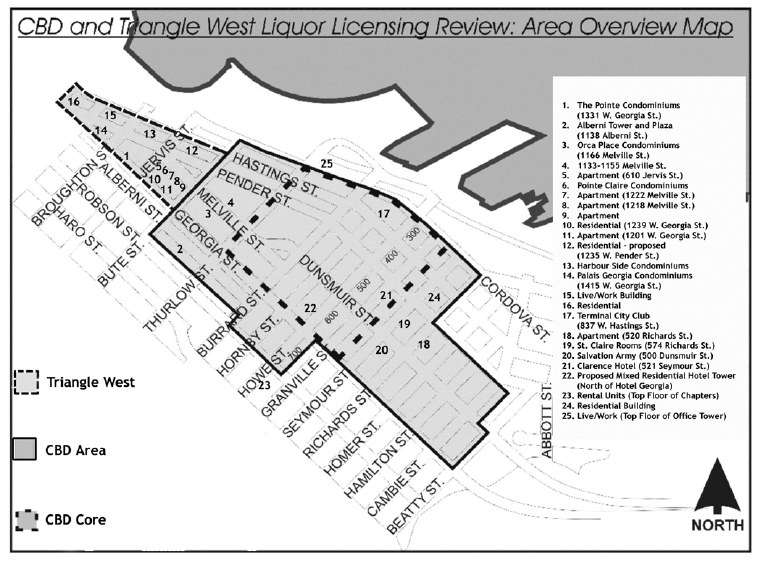
APPENDIX E
